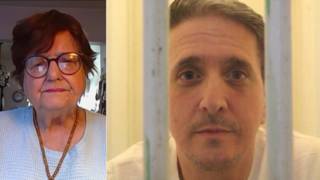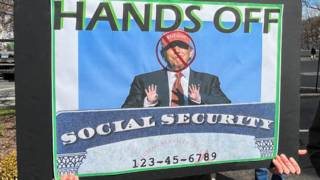
Topics
Guests
- Cheryl Pilateone of the lead attorneys for Russell Bucklew, who was scheduled to be executed shortly after midnight Wednesday morning in Missouri.
The U.S. Supreme Court has stayed the execution of a Missouri death row prisoner who was set to become the first to be executed since Oklahoma’s botched killing last month. Russell Bucklew’s attorneys asked for a stay because he suffers from a medical condition they say could cause him undue suffering, a violation of the Eighth Amendment prohibiting “cruel and unusual punishments.” Bucklew won an initial stay on Tuesday, and the Supreme Court followed up on Wednesday with another ruling halting the execution and sending the case back to a federal appeals court. The court’s ruling marked a shift from a pattern of rejecting similar cases, suggesting justices may be concerned about the secretive and unregulated compounding pharmacies that provide the lethal injection drugs states like Missouri refuse to disclose. We are joined by Cheryl Pilate, one of Bucklew’s lead attorneys.
Transcript
JUAN GONZÁLEZ: Human rights advocates have welcomed the Supreme Court stay of execution for a Missouri man who was set to be the first prisoner put to death since Oklahoma’s botched execution last month. Russell Bucklew, age 46, was scheduled to die by injection at 12:01 a.m. Wednesday for killing a man during a crime spree in 1996. His attorneys asked the courts to grant Bucklew a stay because he has a rare medical condition which causes weakened and malformed blood vessels, as well as tumors in his nose and throat. They argued he could have experienced great suffering during the execution process. On Tuesday night, just over an hour before Bucklew was scheduled to die, Supreme Court Justice Samuel Alito issued an order halting the execution.
AMY GOODMAN: Then, on Wednesday, the court followed up with another ruling that said a lower federal court needs to take another look at the case. That lower court will be the Eighth Circuit Court of Appeals, which had lifted an earlier stay by a smaller panel of the court, which was based on Bucklew’s claim that the state’s execution protocol, as it would have been applied to him, presents a, quote, “objectively intolerable risk of harm” in that it’s “sure or very likely to cause … needless suffering.”
For more, we’re joined by Cheryl Pilate, one of the lead attorneys for Russell Bucklew. She’s joining us from Kansas City Public Television.
Cheryl, we last spoke to you in February, shortly after your client, Herbert Smulls, was executed by Missouri. Welcome back to Democracy Now! A different situation—you have been going nonstop since the execution time was set, and you got the original stay. Explain what’s happened to Russell Bucklew. And on what grounds has the whole Supreme Court ruled on the stay?
CHERYL PILATE: The basis for our claims is really grounded in Mr. Bucklew’s specific medical condition and the dangers that would arise from executing someone with that condition by lethal injection. Of course, the risks are heightened by the use of a essentially secret compounded drug about which there are no assurances of quality, purity or potency. We had really solid opinions from some experts who agreed to work with us as the execution date approached. And they said that any number of things could happen to Mr. Bucklew, and, in fact, those horrible possibilities were very likely and included hemorrhaging, bleeding into his throat, coughing, choking, suffocating. He has these vascular tumors in his face and in his head and in his throat. And any swelling of them could cut off his airway, which is already partially obstructed because of the tumors. And then there was the problem of whether the lethal drug would circulate properly in his system, and if it did not, it would lead to a prolonged and excruciating execution. So we had some very solid medical evidence, which actually was not controverted by the state, and we placed it before the courts and were very grateful that we got the stay of execution.
JUAN GONZÁLEZ: Well, this now goes back to the Eighth Circuit Court. Could you talk about that court and its record or history in dealing with capital punishment cases?
CHERYL PILATE: Well, the Eighth Circuit is very interesting. We got a stay of execution initially from a panel of the court in a two-one decision, and that was vacated by what’s called the court en banc, the entire court, by a seven-four vote, which was of course disappointing. There are obviously divergent views on a number of things concerning the death penalty, one of them, frankly, being the standard that needs to be satisfied in order to prove an Eighth Amendment claim. And I imagine that that will be the focus of any of the proceedings when we return to the Eighth Circuit. There are a lot of standards and what I guess the lay public would perceive as buzzwords tossed around. Do you have to show a substantial risk of serious pain? Does it have to be severe pain or excruciating? Do the risks have to be intolerable? There’s a lot of argument around that.
And there’s also an issue about whether you can essentially prove—plead and prove an Eighth Amendment claim without offering an alternative, feasible, constitutional means of your client being executed. And we, of course, have asserted there’s grave problems with that. In Mr. Bucklew’s case, of course, there’s not even enough information known about how these secret drugs would interact with his system, in order to answer that question. But at a more fundamental level, we think it’s unethical to compel an attorney, or would cause an attorney to violate their ethics, to propose a means for the demise of their own client.
AMY GOODMAN: Can you talk about your motion to compel Missouri Corrections to permit a videographer into the execution to film Bucklew’s execution, why you wanted this and what the response has been?
CHERYL PILATE: Well, that motion was really an effort to peel back one of the many layers of secrecy that surrounds executions. You know, we’re dealing with a process where there’s a secret drug, no assurances. We don’t know where it comes from. We’re not even able to find out if it’s tested. And then you have all these anonymous execution team members, about which virtually nothing is known, and they’re referred to by letters and numbers, like M3 or M7 or whatever. And we felt that there was a real need to establish a historical record, preserve evidence and be able to show what happens in an execution.
An execution, in a lot of ways, is a stage-managed production, with some of the actors never seen. They’re offstage. The curtains come up, the curtains go down. The individual who’s being executed is laid out on a gurney before the audience, but most of him is covered up. He may try to speak, but there’s no microphone, as I understand it, to convey his words to anyone. And the entire effort seems to be aimed at providing assurances that it is a humane process. And we believe, actually, it’s been very deceptively sanitized, and there are a lot of things about it that are very troubling. And we wanted to establish a video record, because there’s only a limited number of witnesses permitted to watch, and those witnesses are vetted by the warden. There is some press allowed, and then the victim’s family and the prosecutor and police may come. And then the—what they call the offender, our client, gets to pick a small number of people to come. But there, to date, has been no really reliable reporter, outside of some members of the press whose accounts we appreciate. But we wanted something that could not be questioned. We wanted a video of what happens during an execution.
AMY GOODMAN: So, has that been ruled on?
CHERYL PILATE: Actually, that motion was rejected. I’m hoping that if our case continues, that we’ll be able to perhaps litigate that again and provide more evidence as to why that motion should be granted.
JUAN GONZÁLEZ: I wanted to get your response to U.S. District Judge Beth Phillips. On Monday, she denied your client’s stay of execution, saying Bucklew did not offer any suggestions for a safer way he could be put to death. She wrote, quote, “His complaint does not include any reference to a feasible and more humane alternative method of execution. … Rather, the complaint appears to allege that there is currently no constitutional method of executing Bucklew.” Your response?
CHERYL PILATE: Well, that really gets back to the issue I just talked about and the divergent views about whether a Supreme Court case, called Baze v. Rees, requires the prisoner, plaintiff, through his attorney, to allege a feasible alternative means of execution. But we did in fact allege an alternative means, I guess, if you want to call it that, which is that we need medical testing, diagnostic imaging, to see what is going on with these vascular tumors. They constantly grow throughout life, and we needed to know their size, their location, what they look like, prior to being able—for anybody, really—to propose a safer means of execution for Mr. Bucklew. Much more needs to be known about what is growing in his head and in his throat.
And we actually faulted the Department of Corrections for not conducting any imaging studies or having any imaging studies done of Mr. Bucklew during the last four years, despite the fact that these vascular tumors had previously been monitored. The last MRI was in June 2010. And the vascular tumors were referred to with terms like “very massive.” And there was a comment made about the, quote, “severely compromised airway.” Why someone would not follow up on these very troubling indications and not get continuing imaging studies, I can’t tell you, but the Department of Corrections did not have those obtained.
AMY GOODMAN: Well, Cheryl Pilate, I want to thank you very much for being with us. The case now goes back to the Eighth Circuit. We’ll continue to follow the case of Russell Bucklew.
When we come back, mass protests through Brazil around the World Cup. And what’s going to happen to Don Sterling? Will the NBA challenge his right to own the Clippers? Stay with us.












Media Options